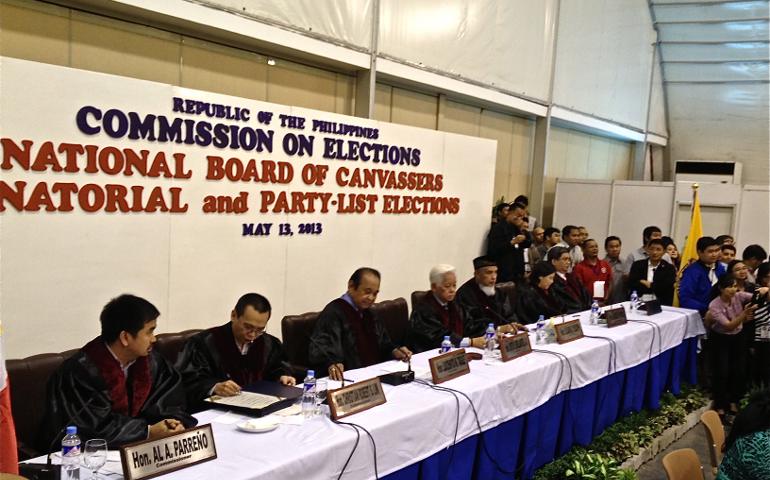
The Philippines Commission on Elections convenes as votes are counted in the May 13 national elections. (Photo by Chona Yu)
Three-fourths of the seats up for grabs in the Philippines senatorial mid-term elections were officially announced Saturday as going to members of a coalition pledged to support the country’s president, giving him majorities in both chambers of the country’s national congress.
The Commission on Elections (COMELEC) proclaimed the winners for the 12 open senate seats May 18, five days after voting ended.
Nine of the twelve went to supporters of President Benigno Aquino, who has faced sustained criticism from national church leaders for his support of a law giving universal support to contraceptive services.
The May 13 elections, which saw nearly 40 million people casting votes from more than 18,000 national, regional, provincial and local offices, was not without incident. The election commission was accused of rushing the senate race proclamations and will have to explain glitches in the electronic voting machines and procedures, as well as suspicion of tampering with transmitted voting tallies.
Victory for five senatorial candidates -- Juan Edgardo Angara, Alan Peter Cayetano, Loren Legarda, Francis Escudero and Grace Poe-Llamanzarez, all part of Aquino’s coalition dubbed Team PNoy -- had come on Thursday.
COMELEC Chairman Sixto Brillantes raised the winners’ hands before relatives and supporters, at a televised ceremony at the Philippine International Convention Center in Pasay City.
Nancy Binay, senatorial candidate for the United Nationalist Alliance Party, had also been proclaimed a winner, but she skipped the ceremony. Her party filed an official objection to the proclamation noting that COMELEC had not resolved questions about a delay in reporting results and problems with transmission of voting allies, and a technician’s reported accidental deletion of data from a server holding unofficial voting tallies.
Binay told reporters she wanted to be certain that she had won before being proclaimed. She accepted the proclamation later on the weekend.
By late on Friday with nearly 76 percent of election results tallied, COMELEC proclaimed three more senatorial bets as winners: Paulo Benigno Aquino IV (the president’s cousin), Aquilino Pimentel III and Antonio Trillanes IV, all part of Team PNoy. The Philippines uses plurality-at-large voting for seats in the Senate: the 12 candidates with the highest number of votes win the twelve seats up for election.
The final winners were named Saturday evening: Nacionalista Party bet Cynthia Villar, and United Nationalist Alliance candidates Jose Victor Ejercito and Gregorio Honasan, Jr.
Doubts about process
Speedy proclamation did not remove doubts of concerned parties, including Auxiliary Bishop Broderick Pabillo of Manila, the chairman of the Catholic bishops’ National Secretariat for Social Action, Justice and Peace (CBCP-NASSA). Speaking in Tagalog over Church-run Veritas 846 radio, Pabillo said he is convinced there has been cheating during the transmission of election results.
Too many glitches have been reported since voting started on Monday, he said, noting reports involving flawed voters’ lists, defective Precinct Count Optical Scan machines and compact flash cards.
“There were so many snags ... transmission was messed up. First they said the transmission of data was fast, then it slowed down,” Pabillo said.
He urged media to press for answers to the questions raised on the system of voting and tallying of votes.
The Parish Pastoral Council for Responsible Voting (PPCRV) has questioned the slow transmission of votes from the individual clustered precincts to the transparency server in Manila.
To ensure transparency in reporting election results, the election commission allowed for the direct transmission of balloting data to computer servers of the Municipal Board of Canvassers for official vote counting as well as to computer servers accessible by citizen watchdog groups and the media.
By midnight on May 14, barely 70 percent of the total clustered precincts in the Philippines were able to transmit the results to the central transparency server, PPCRV reported. The same period in the 2010 National Elections, the election monitor group had received around 85 percent of the total tallies for precinct clusters.
PPCRV National Chairperson Henrietta De Villa said the group was “deeply concerned about the slowness of the arrival of transmissions,” that was causing volunteers to struggle to do their work as election monitors.
Among the winners were many familiar family names:
- Grace Poe-Llamanzarez is the daughter of the late movie action star Fernando Poe who lost to Gloria Arroyo in the 2004 presidential elections.
- Joseph Estrada, who was impeached as president for plunder in 2001, was elected mayor of Manila. His son Ejercito, was among the top 12 vote-getters in the senatorial race.
- Reelected to the House of Representatives is Gloria Arroyo, who served as president of the Philippines from 2001-2010. She campaigned for reelection from a hospital room in the Veterans Memorial Medical Center in Quezon City where she has been detained since 2011 while facing charges of electoral fraud to win a Senate seat for a supporter in the 2007 elections.
- Imelda Marcos, wife of deposed President Ferdinand Marcos, won a second term as Congresswoman for Ilocos Norte province in northern Philippines, where her daughter, Imee Marcos, was also re-elected governor.
The prevalence of “political dynasties,” worries him, Pabillo said over Veritas radio, as does the reported “rampant vote buying and selling.”
“Where there is patronage politics, there is poverty,” Pabillo said.
Speaking to NCR, sociologist Randy David said that government run by relatives and coalition teams “is not very healthy.”
“Democratic politics is all about checks and balances,” he said. “Without that, there is no real opposition, no real debate, and alliances that result from a situation like that tend to be opportunistic, rather than ideological or program-based."
“We do not have real opposition because we do not have real political parties,” David said.
Reform work continues
The lack of a political ideology challenges voters and people committed to voter education, says Fr. Carmelo Diola, founder and executive director of the Dilaab Foundation for societal transformation.
Speaking to NCR on the phone from Cebu, central Philippines, Diola explained that parties in the Philippines do not have clear, distinct ideologies. “They are very confusing here, and voters must be taught how to sift through the various promises and perspectives politicians present them,” he said.
Dilaab has been addressing this through “circles of discernment,” or groups of families, young people, Basic Ecclesial Communities, and other units that are configured to reflect on developments in their communities and country, and how a candidate can contribute to improving the community.
In recollection-like gatherings, participants evaluate the candidates’ lifestyle, accomplishments, supporters, election conduct, and general reputation, Diola said. He said 30 dioceses implemented this education program for the 2013 polls.
Outside Manila, Diola noted “dramatic change” in leadership in many places. For example, in Cebu traditionally “well-entrenched” families have conceded defeat to their opponents. “There was vote-buying, but this time, there were also arrests by police,” Diola said.
He questioned the claim of the Philippine Legislators’ Committee on Population and Development which issued a statement Thursday saying the victory of incumbent House Representatives who had pushed for the passage of the Reproductive Health Law (RH Law) showed that “There is no Catholic vote” in the Philippines.
Such a claim would need to be confirmed, Diola said. “In my view, it turned out just even for proponents and opponents of the RH Law. While people who supported the RH Bill may have been voted in, the leading spokespersons for and against the bill were both not placing well in the senatorial race,” Diola said. RH Law campaigner Risa Hontiveros, despite Aquino’s campaign presence, placed 17th in official COMELEC results.
Voters also were to select one out of more than 130 groups vying for seats in Congress through the Party-List System that seeks proportional representation in election of the House of Representatives. Party-lists are accredited by COMELEC as representatives of marginalized or underrepresented national, regional and sectoral parties, organizations or coalitions. Youth, women, farmers, workers, and environmentalists are some sectors and concerns covered by party-lists. The religious sector is not represented.
In Quezon City, voter Tess Tayong, mother of two, told NCR she voted for Overseas Filipino Workers (OFW) Family Party-List because her husband works in the Middle East. “I didn’t know much about the Party-List system, but I wanted to vote for the OFW party. I just went with OFW Family, but I didn’t really know what they are working for,” Tayong said.
Meanwhile, Buhay (Life) Party-List, led by Mike Velarde of El Shaddai Catholic Charismatic group was topping the Party-List race with 40 percent of total votes cast for Party-Lists. The party’s legislative agenda includes creating laws protecting and preserving the “sanctity of life” and preventing the passage of bills “promoting” divorce, euthanasia, abortion, “total reproductive health,” and homosexuality.
[N.J. Viehland is NCR’s Philippines correspondent.]




